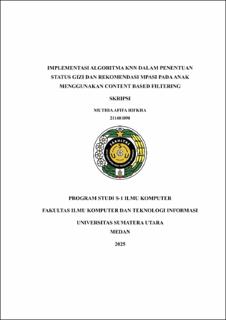Implementasi Algoritma KNN dalam Penentuan Status Gizi dan Rekomendasi MPASI pada Anak Menggunakan Content Based Filtering
Implementation of The KNN Algorithm in Determining Nutritional Status and MPASI Recommendations for Children Using Content-Based Filtering

Date
2025Author
Rifkha, Muthia Afifa
Advisor(s)
Sharif, Amer
Efendi, Syahril
Metadata
Show full item recordAbstract
Nutritional problems in children during the golden age remain a major health issue in Indonesia and are still one of the main contributors to the high rate of stunting. One of the causative factors is the inappropriate provision of complementary feeding (MPASI) in terms of timing, frequency, and nutritional quality. This study aims to develop a classification system for the nutritional status of children aged 6–24 months based on daily MPASI intakeof using K-Nearest Neighbors algorithm, as well as to provide MPASI recommendations tailored to the child’s nutritional needs through the Content Based Filtering method. The data used were obtained through surveys at Tanjung Rejo Community Health Center and surrounding areas, which were then processed through stages of preprocessing, nutritional content calculation, feature normalization, and Euclidean distance calculation. This study classifies children’s nutritional status into the categories of “Under,” “Normal,” and “Over.” The test results has 39 datas and show that the built of KNN model successfully achieved an accuracy of 90%, precision of 90%, recall of 90%, and an F-1 score of 90%. The MPASI recommendation system can also support more targeted nutritional interventions for children aged 6–24 months. Thus, this study can serve as a reference for the use of technology in nutritional status monitoring and data-driven nutrition recommendations, in order helping to reduce stunting rates and improve the quality of child health in Indonesia.
Collections
- Undergraduate Theses [1273]
